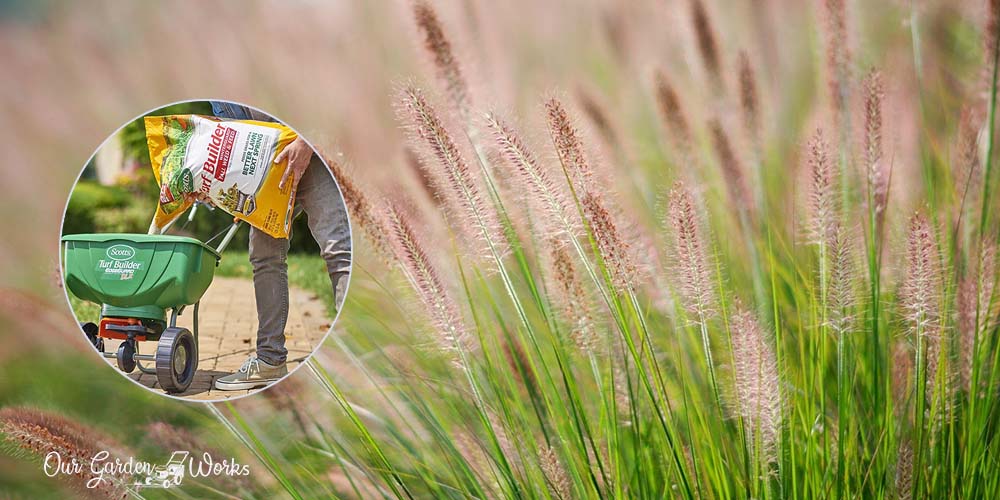Many gardeners are now recognizing the hazards of chemical products to the environment and general health. Many local government laws are also implementing the localized ban for harsh chemicals to control weeds and pests.
That’s why organic weed killers can help provide proper weed control without harming other plant life and wildlife in your garden.
In A Hurry, Our Top Picks:
In this post, we will share the top organic weed killers that most professional gardeners use to hack their way to control weeds.
However, to properly use our recommended solutions, it pays to know how weeds spread and how most organic herbicides work. Otherwise, you will just waste so much time waiting for the weeds to die.
How Do Weeds Spread?
Weeds, like other plants, produce blooms that contain their seeds. The weed seeds are light and tiny which makes them easy to be swept by the wind, carrier insects, or naturally fall in the ground. As soon as the seeds fall into the ground, all they need is sunlight and enough moisture to germinate.
The two strategies to prevent the growth of weeds are getting rid of the weeds before they bloom and preventing the weed seeds in the ground from germinating.
In the herbicide universe, these two strategies are chemically organically done through two classifications: pre-emergent herbicides and post-emergent herbicides.
How Do Organic Herbicides Work?
To help you find the best organic weed killer for your garden, here are some important things you should know for a quick and easy battle against persistent weeds:
Pre-emergent & Post-emergent Herbicides
Pre-emergent herbicides or weed killers prevent the weed seeds from germinating. It is applied to the soil every one or two weeks to cover all the buried weed seeds in your garden.
So, after pulling out all the weeds in your garden, it’s best to use a pre-emergent herbicide so there’ll be no more sprouting weeds for the next few days.
Post-emergent herbicides control weeds that are already established. They attack the delicate cell walls of the weeds and let them dry out in a span of days or weeks.
Organic post-emergent weed killers often contain stronger acids like acetic acid to break into the plant’s cell walls.
Selective & Non-selective Herbicides
Aside from the two classifications, weed killers or herbicides also work in two ways. Selective weed killers control the specific types of weeds while non-selective herbicides do not spare any plants on their scope.
Before purchasing any weed killer, check first if it is a selective herbicide to keep you from unintentionally killing your other plants in the garden.
9 Best Organic Weed Killers For 2023 – [Top Picks]
Here are the 9 best organic weed killers that you can try as you aim for a more organic way of handling weeds or transitioning from chemical use to environment-friendly options:
1. Burnout Weed & Grass Killer Concentrate
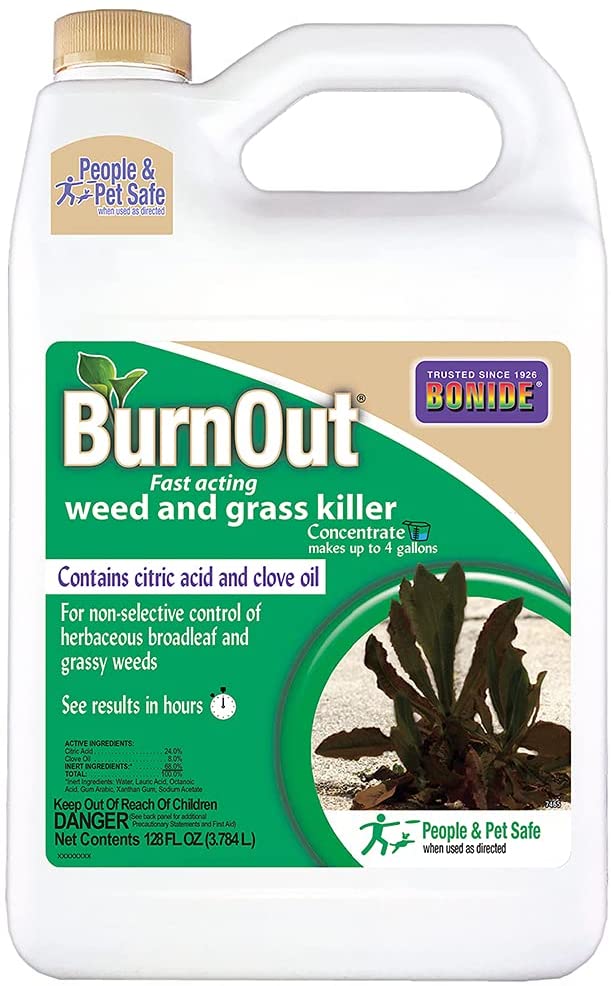
Clove oil and citric acid are popular natural ingredients for weed control in most organic gardens.
You can buy and dilute your weed killer solution or buy a pre-mixed concentrate like Burnout Weed & Grass Killer Concentrate. It is a non-selective post-emergent solution for your persistent weeds in the garden.
Most gardeners find it effective for the following weeds:
- Crabgrass
- Bermuda
- Japanese stiltgrass
- Bugloss
- Hounds tongue
- Young foxtails
- Clover
- Dandelions
- Grass patches
- Bindweed
- Poison ivy
- Scotch Broom
The supplier provides both concentrate, which weighs 8.5 pounds, and a ready-to-use version of this herbicide. It contains 24% of citric acid and 5% of clove oil to naturally dry out the notorious weeds in your garden. Unlike chemical herbicides like RoundUp, this organic weed killer is a better alternative for safer gardening. The manufacturer claims that it can kill any plant that it can get contact with.
The key feature of BurnOut is it is waterproof for a few hours after application. You may also use it in temperatures 40F and above. It is perfect weed control for those organic gardeners who have kids and pets running around the garden.
You can use it for safely managing weed growth in the following parts of the property:
- Around borders
- Driveways
- Sidewalks
- The base of mature trees
- Around buildings
- Fence lines
- Grass below apiary
- Barns
- Pastures
- School grounds
- Greenhouses
The recommended burnout concentrate dilution ratio of the manufacturer is 1:3 (concentrate: water). However, most of the users find more luck in using the product at a 1:1 dilution ratio. Another crucial step in successful weed control using this product is by spraying weeds to the point that they are dripping wet.
For tough weeds like dandelions, you may need to re-apply for another two to three rounds to let the solution get to the roots and kill them completely. It may also cause some burning feeling on your hands so make sure to use gloves when spraying it on your lawn. Use a pump spray with a filter for an easy and smooth application.
Be careful in using it around your ornamentals and other garden plants to prevent them from having burns on their leaves. The best results usually show after 48 hours or 2 days after application. It also has a strong clove scent which can be its best and worst feature since not all gardeners are a fan of it.
The only concern that bugs most gardeners is its misleading dilution procedure and its ineffectiveness in dealing with some tough weeds. The nozzle of the sprayer that comes with the product is also too short, which makes it hard to use. The solution may also clog other sprayers so make sure to have a filter handy like a cheesecloth to prevent damaging your sprayer.
Pros
- A good alternative to chemical herbicide using clove oil and citric acid
- Kills weeds within 48 hours
- Kid and pet-friendly
- Ideal for treating small spaces
Cons
- The weeds should be dripping wet for the solution to work.
- It can clog unfiltered sprayers.
- It has a misleading dilution ratio.
- The solution may cause a burning feeling to the skin.
- The product can be too costly for treating huge yards since it should be applied until the weeds are dripping wet.
- May not be effective in getting rid of Mustard and Maltese Star-Thistle, Kudzu.
2. Scotts Turf Builder WinterGuard Fall Weed and Feed
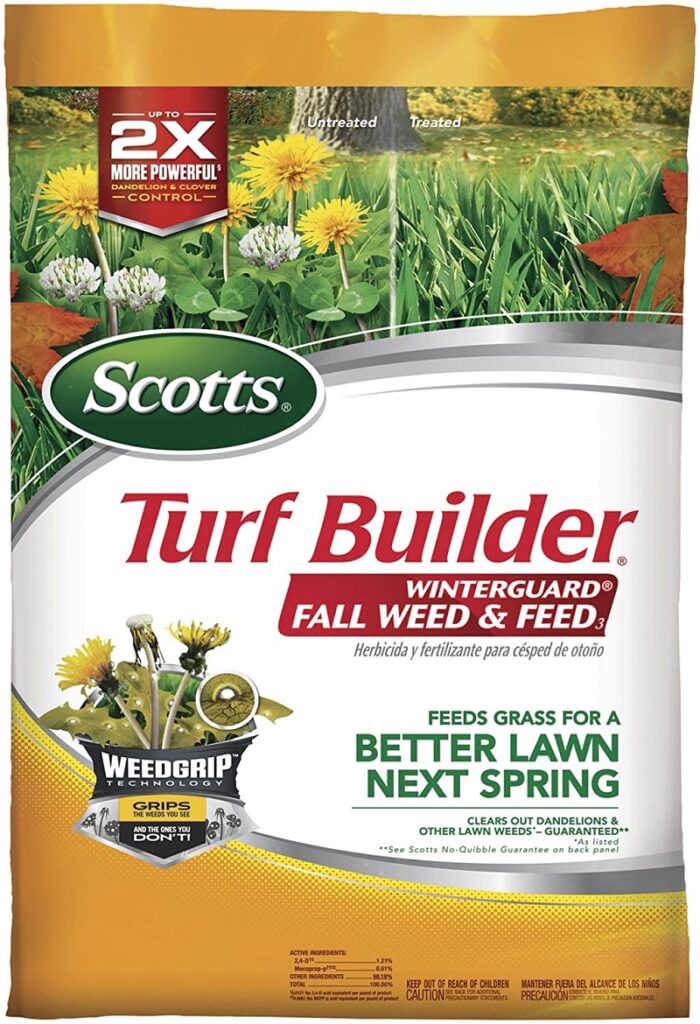
2,4-D is another organic acid that is used as a systemic herbicide in treating weeds. It selectively kills most broadleaf weeds and does not affect the plant health of most grasses such as lawn turf and grassland. Scotts Turf Builder WinterGuard Fall Weed and Feed is one of the popular brands that used 2,4-D.
This organic weed killer contains 1.21% of 2, 4-D, and 0.61% of Mecoprop-p. It also comes with plant food that has an NPK ratio of 28-0-6 to help your existing grass grow greener. The manufacturer claims that this weed killer can control tough weeds like dandelions and clover.
Other weeds included in its list are as follows:
- Aster
- Clover (red)
- Lambsquarter
- Red sorrel (sheep sorrel)
- Bindweed
- Clover (white)
- Lespedeza (seeding)
- Scarlet pimpernel
- Bittercress
- Cudweed
- Lippia (matchweed)
- Black medic
- Curly dock
- Mallow
- Shepherd’s-purse
- Dandelion
- Moneywort
- Smartweed
- Buckhorn
- Dichondra
- Morning glory
- Sowthistle
- Hawkweed
- Yarrow
- Chickweed/stitchwort
- Healall
- Purslane
- Yellow rocket
- Chicory
- Bull thistle
- Dollarweed/pennywort
- Mustard
- Spurweed
- Burclover
- English daisy
- Buttonweed
- evening primrose
- Pepperweed
- Canada thistle
- Filaree
- Pigweed
- Carpetweed
- Fleabane
- Plantain
- Vetch
- Catsear (coast dandelion)
- Ground ivy
- Wild carrot
- Henbit
- Pusley
- Cinquefoil
- Horseweed
- Clover (hop)
- Knotweed (seeding)
- Ragweed.
Scott’s Winterguard is the ideal organic weed killer for huge lawns since it comes in three sizes that can handle lawn sizes starting from 5,000 sq. ft., 12,000 sq. ft. to 15,000 sq. ft. The only concern that has ruined most lawns is that some gardeners failed to learn that it should not be applied to the following varieties of grass:
- Bentgrass
- Carpetgrass
- Dichondra
- Floratam
- Lippia
- St. Augustine grass
You should also expect temporary discoloration on your grass if you have any of the following varieties: Bermudagrass, Bahia, Centipedegrass, and Zoysia. There are also several restrictions in using this weed killer in your garden which include:
- Do not apply it on your lawn more than twice a year.
- There should be a minimum of 30 days between applications.
- It contains granules that should not get into the flowers, shrubs, fruit, and vegetable plants near your lawn.
- It’s crucial to delay the application of this herbicide on newly seeded, sodded, and sprigged areas. The ideal time of application using this herbicide should be after the new grass has been mowed four times.
- You must apply this herbicide on moist grass so the granules will stick to the leaves.
The only thing that killed the lawns of most gardeners is not knowing about the restrictions and limitations of this organic killer. The outdoor temperature should range between 60F and 90F for best results. However, unlike other oil-based herbicides, it is not waterproof and can be washed away if you water it immediately.
Leave the lawn unwatered for about 24 hours after the application of this weed killer. You should also wait for at least a month before planting new sod or grass. It is also formulated with Weedgrip Technology that manages all the weeds in your garden, even the ones that you don’t see. However, don’t oversow your lawn or you’ll end up burning your grass.
This selective and post-emergent organic weed killer can make the weed stems and leaves begin to twist and curl within a few days. However, for full control, a month or more may be required. Lastly, keep this herbicide away from bodies of water as it may leak and affect the marine life in your garden. Learn more here.
Pros
- A trusted brand for lawn care
- Kills weeds and feeds your lawn for next spring
- Uses 2, 4-D which is an organic acid
- Selectively kills weeds
- Suitable for big lawns
- Affordable for the span of its scope
Cons
- Not applicable for certain types of lawn grasses such as Bentgrass, Carpetgrass, Dichondra, Floratam, Lippia, and St. Augustinegrass lawns.
- May cause lawn discoloration to Bermudagrass, Bahia, Centipedegrass, and Zoysia lawns.
- Not safe to use around kids and pets.
3. ECO Garden PRO – Organic Vinegar Weed Killer
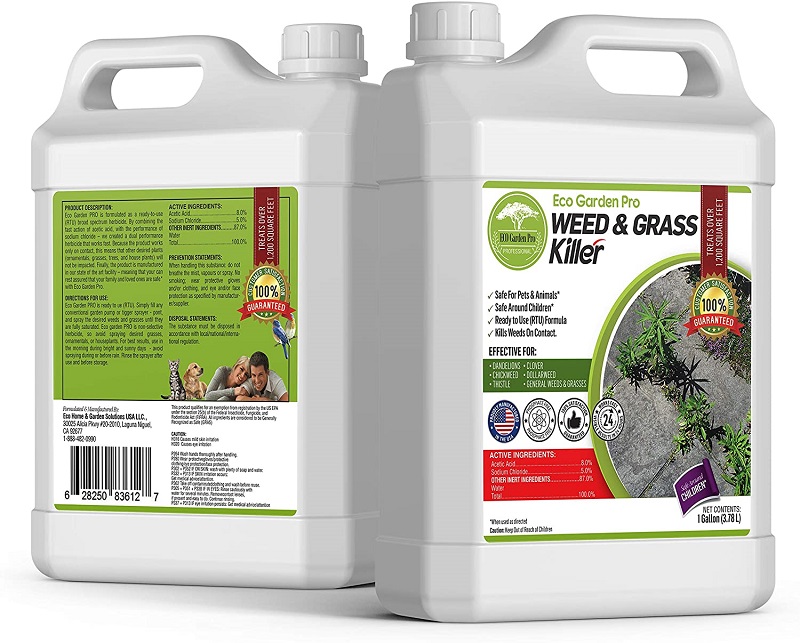
Another stellar brand of organic weed killer is the ECO Garden PRO Organic Vinegar Weed Killer. It is a pre-mixed non-selective weed killer that utilizes acetic acid in vinegar that helps control weeds and kill anything that comes into contact with it.
This ready-to-use weed killer contains natural white vinegar(acetic acid 8%), organic rock salt (sodium chloride 5%), biodegradable plant activators, and fermentation-derived cofactors to get rid of notorious weeds faster and within 24 hours. It can control the stubborn weeds that include:
- Dandelions
- Clover
- Chickweed
- Dollar weed
- Thistle
- Crabgrass
- Moss
- White cover
- Poison Ivy
The best feature of this weed killer is being safe to use around kids, pets, bees, and even marine life. Acetic acid saturates in the air after doing its work on the weeds and does not leach into the soil and groundwater.
If you are looking for a perfect environment-friendly weed killer, this herbicide can provide you with that advantage.
The manufacturer claims that the formula will deliver immediate results 24 hours after the application. However, it only works best in killing weeds when you apply it under full sun. Since it kills any plants that it comes in contact with, it’s a perfect solution for the weeds in your:
- Driveways
- Sidewalks
- Concrete
- Mulch beds
- Pavement
- Flower beds
- Parking lots
- Farmlands
The best feature of this organic weed killer is it is free from harmful chemicals like phosphate and gaining recognition from the USFDA for being a General Recognized As Safe (GRAS).
It also kills the weeds to the root and can treat about 1,200 sq. ft. of lawn. Make sure to use protective gloves and mask during application to prevent inhaling the product.
Expect that your lawn will have the smell of vinegar for a while until it dissipates for the next few days. This weed killer does not damage concrete, walkways, and pathways, so you don’t need to work about staining them.
The only setback for some gardeners about this product is it doesn’t come with a sprayer.
Pros
- Pet & kid safe
- Eco-friendly: Safe for bees, fish, and livestock
- Phosphate-free
- Safe for groundwater
- Utilizes natural ingredients: acetic acid in vinegar and salt
- USFDA approved as safe(GRAS)
Cons
- Does not come with a sprayer
- Tough weeds may need reapplication
- Does not work if applied in the afternoon or at night
4. Natural Armor Weed and Grass Killer
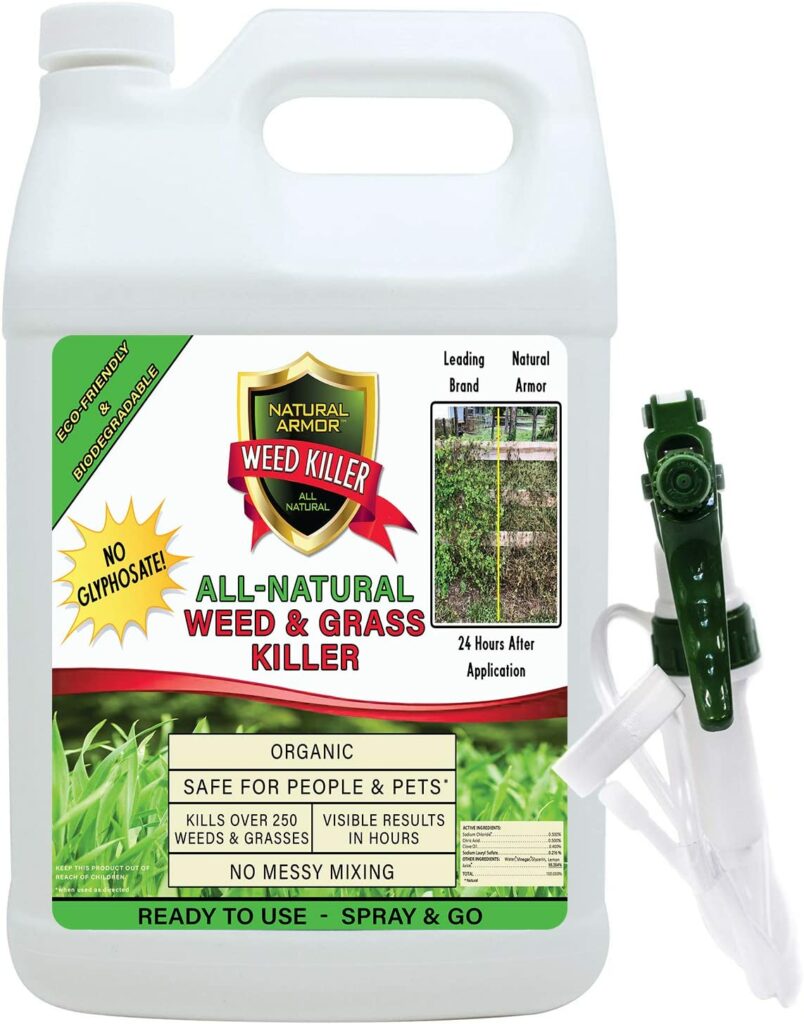
Natural Armor Weed and Grass Killer is another non-selective organic weed killer that utilizes popular natural acids. It is a ready-to-use formula that is formulated with 0.5% of sodium chloride, 0.5% of citric acid, 0.4% of clove oil, and other ingredients such as vinegar, glycerin, and lemon water.
This weed killer is safe to use around kids, pets, and the environment. It does not contain any glyphosate and is biodegradable. The packaging also comes with a free sprayer.
Since it is already ready to use, you no longer face any problems when it comes to dilution and mixing ratios. You can use it in parts of your house where you don’t want to see any weeds, such as:
- Flower beds
- Below shrubs and trees
- Barns
- Driveways
- Edging
- Fence lines
- Foundations
- Gravel area
- Mulch beds
- Overgrown weed areas
- Parking area
- Patio
- Paver
- Pool area
- Rock walls and pathways
- Walkways
- Wells & water systems
For best results, you must use it in direct sunlight with temperatures at least 65°F and warmer and rain is not expected. The manufacturer claims that they will refund your purchase if you were not satisfied with it.
The solution will work on the targeted area within hours after application. However, for tough weeds, re-application may be necessary for full control.
The only concerns and reminders that you take note of are its failure to kill weeds in shaded areas, strong vinegar smell, and impact on concrete. Some gardeners who experienced leaking bottles of this product found that the acid can eat up the finishing of your concrete pavements and epoxy floors.
The sprayer is also hard to use for most gardeners, so it’s best to buy this weed killer if you have a spare sprayer on hand. Some of them found a trick by twisting the nozzle, but it’s better to be sure by having a spare sprayer handy.
Pros
- Kid & pet-friendly
- Safe for the environment
- Biodegradable
- Ready to use; no more mixing and diluting process
- No chemical smell but strong vinegar scent
Cons
- A bit pricey for its size
- Sprayer problems
- Can cause stains and damage on concrete pavements
- Tough weeds need re-application.
5. Energen Carolina LLC Horticultural Vinegar Weed & Grass Killer
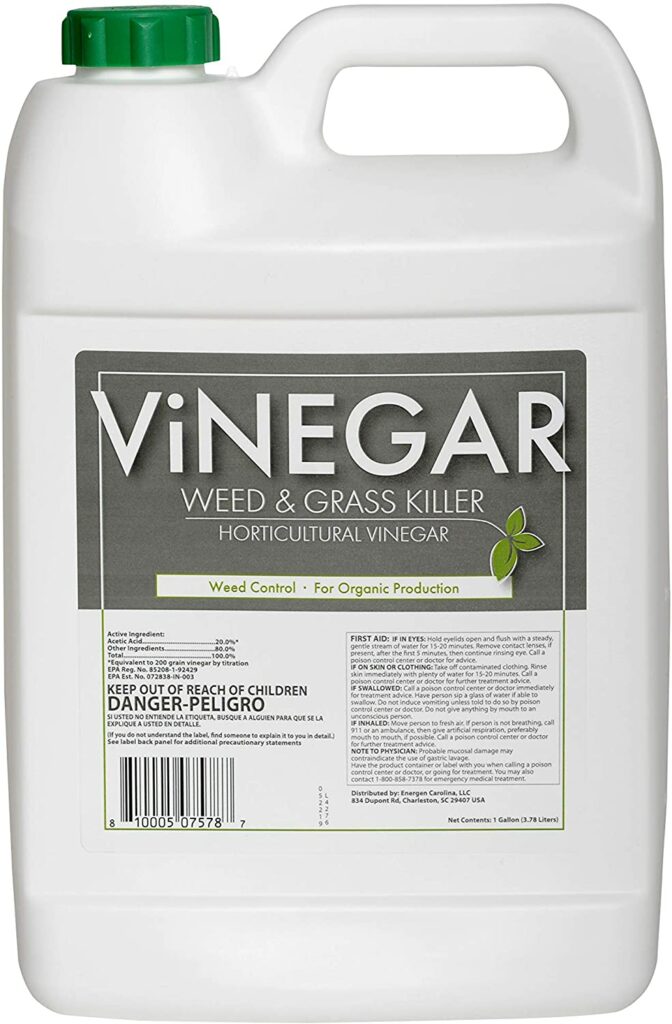
Energen Carolina Vinegar Weed & Grass Killer is a quick-acting, non-selective contact herbicide that contains horticultural-grade acetic acid.
Unlike kitchen vinegar, horticultural vinegar is more potent and should be handled with care. This herbicide is among the organic weed killers that gardeners consider as close to the effectiveness of RoundUp.
The manufacturer claims it can help you get rid of around 250+ varieties of weeds such as crabgrass, clover, dandelions, and ground ivy. It can help deal with different varieties of weeds such as annual broadleaf weeds, perennial broadleaf weeds, annual grasses, perennial grasses, and liverworts.
You can use it to spot treat weeds in areas of your house where vegetation is unwanted such as:
- Driveways
- Sidewalks
- Concrete
- Animal enclosures
- Mulch beds
- Pavers
- Flower beds
- Parking lot
- Barnyards
- Fence rows
- Roadways
This organic weed killer contains about 20% of acetic acid which is 15% to 18% more potent and stronger than the 3% acetic acid in our usual kitchen vinegar.
Due to its concentration, you can dilute it with water with a dilution ratio of 1:3, contrary to the manufacturer’s advice on not diluting it. However, if you are dealing with tough weeds you may use the undiluted solution for spot treatments.
The safety of this product is the cause of most debates among gardeners. Its ability to control weeds is often out of the question. However, it only becomes safe for kids and pets as long as the treated area becomes dry. It also kills plants on contact through rapid desiccation and results can be seen within hours or a day after application.
The best feature of this herbicide is that the solution saturates in the soil and does not leach to the groundwater. Therefore, this is also the reason why this product is a great alternative to herbicides that contain glyphosate.
For best results upon application, check out the following notes from the manufacturer.
Application Guide:
- Apply the solution in temperatures between 50F to 70F in direct sun.
- Spray on a dry lawn and when there is no chance of rain during that day.
- You can apply about 44 oz. to 88 oz. of this solution per 1,000sq. ft.
- Spray every corner and surface of the weeds for better results.
- Expect a strong vinegar odor after application.
The only downside of this herbicide which every gardener should know is it is only effective on actively growing weeds. It is not suitable for the old, mature, dormant, and dried weeds in your yard. It is also highly acidic so make sure to wear proper safety clothes and gear during application.
Some gardeners find great relief from the help that Energen Weed Killer provides. However, some of them are also complaining of weeds coming back after several months of application. It may also be harmful to birds so if you have one, this product is not the one for you.
Lastly, it does not have a sprayer and only comes with a bottle of concentrated herbicide.
Pros
- Utilizes organic acetic acid in dealing with weeds
- Pet & kid-friendly (once dry)
- Works like RoundUp in terms of performance minus the health risks
- Does not leak to the ground soil and groundwater
- A good alternative to glyphosate
Cons
- Highly potent and may cause harm without proper handling
- Only works for actively growing weeds and not on mature weeds
- Does not have a sprayer
6. Green Gobbler 20 % Vinegar Weed & Grass Killer
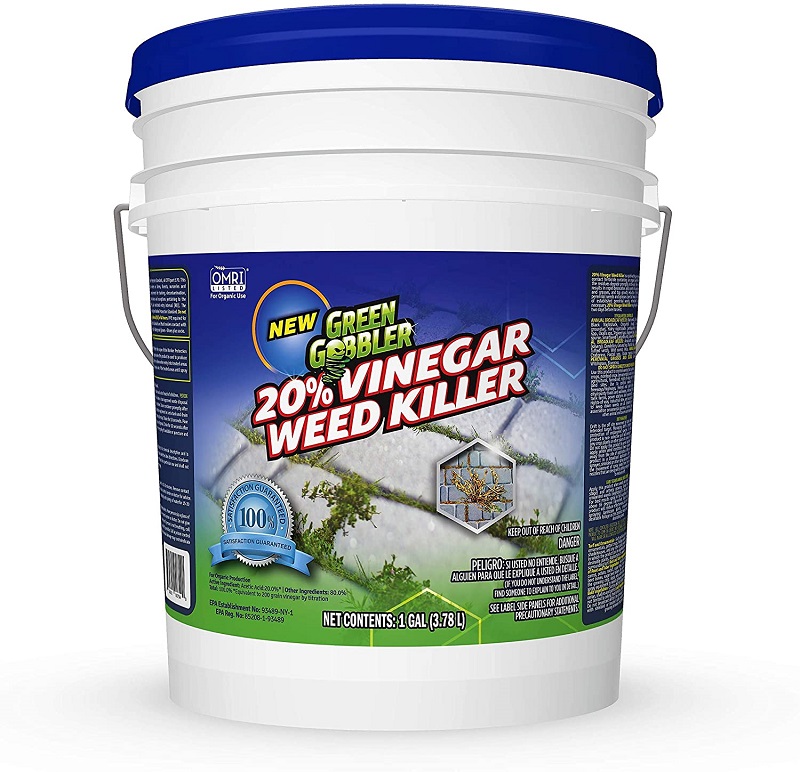
Green Gobbler 20 % Vinegar Weed & Grass Killer is among the few organic weed killers that can achieve a badge of approval from OMRI. It is a non-selective and post-emergent herbicide that contains 20% acetic acid. Horticultural vinegar contains stronger acids that can cause harm when mishandled.
The manufacturer claims that this herbicide can dry out any type of weed within hours and eliminate them after 24 hours. These include the notorious pesky weeds such as crabgrass, dandelions, clover weeds, white clover, and moss.
Since it doesn’t spare any vegetation that it comes to contact with, it is a perfect weed killer solution for:
- Driveways
- Sidewalks
- Concrete
- Mulch beds
- Pavers
- Flower beds
- Parking lots
- Farmlands
- Barns
The best feature of this herbicide is it is derived from ethanol distilled from corn grain. It eliminates the weeds and dissipates in the soil without leaking to the groundwater and other waterways. It is free from glyphosate, phosphate, sulfate, fluorine, and bleach and has a stronger formula than your usual kitchen vinegar.
This comes in a 5-gallon bucket which makes it a suitable weed killer solution for huge landscapes. Any residue of the solution that gets on the soil will be neutralized within a day. It also doesn’t sterilize the soil and get rid of the good biological environment so you can enjoy healthy plants after getting rid of the weeds.
The only mistake that most gardeners make when buying this solution is that they expect no new growth after one application.
Green Gobbler is a post-emergent herbicide which means it only takes care of the mature weeds and does not keep weed seeds from germinating. So, you’ll have to reapply the solution when new weeds start to sprout.
Unlike other herbicides, it has no sprayer. So, make sure that you have one before buying a gallon or a 5-gallon of this herbicide. It works best when used in direct sunlight at temperatures above 65F and for weeds that are actively growing. However, make sure to use proper safety equipment during application since it is highly potent.
Aside from being a pet-friendly and eco-friendly weed killer, it is also multi-purpose. You can also use it for cleaning your house and removing molds.
Here are the mixing ratios for weed control and cleaning:
- Horticultural/Outside – Use at full strength.
- Regular cleaning-Mix – 1 Part Vinegar to 5 Parts Water.
- Heavy-duty Cleaning – 1 Part Vinegar to 2 Parts Water.
Though it has a lot of benefits, horticultural acetic acid at 20% is toxic to birds and marine life. The concentration of the natural acid can be too much for them to handle and unlike other animals like dogs.
Dogs and kids should also be allowed to the treated area once it starts to dry up to avoid risks of skin and eye irritation.
Pros
- Fast-acting: Works within hours
- Works better than RoundUp
- 100% derived from corn
- OMRI-listed
- Multi-purpose: For weed control and cleaning
Cons
- Post-emergent: weed seeds may continue to germinate after mature weeds are removed
- For tougher weeds, two applications might be necessary.
- Has strong vinegar smell
- May cause harm if not handled properly
7. Bonide 1 qt. Ready to Spray Corn Gluten Weed Preventer
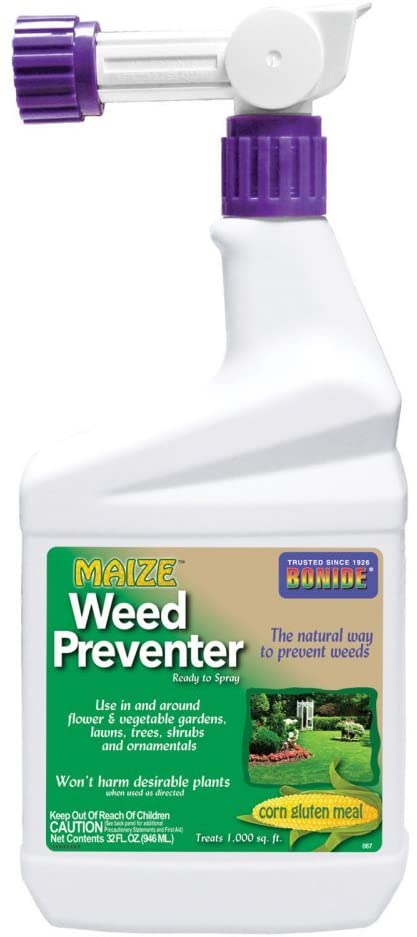
Corn gluten meal is a popular organic substitute for a chemical pre-emergent herbicide that kills seedlings as they sprout and weed seeds from germinating. Bonide 1 qt. Ready to Spray Corn Gluten Weed Preventer uses corn gluten meal to function as a selective weed killer and specifically kill weeds without harming your grass.
This herbicide is ready to use and has about 99.81% of corn gluten meal and can treat 1000 sq. ft. of lawn. It is safe to use on Zoysia grass and other types of desirable grass. However, it’s best to test it first on a small patch before going all the way in spreading it on your lawn.
What most gardeners fail to realize before buying this herbicide is it doesn’t kill existing weeds. It only prevents them from growing again. Another setback is also its bottle spray which may not be as functional as desired.
Pros
- Made from 99% corn gluten meal
- Works as a pre-emergent herbicide
- Selectively kills weeds and keeps most varieties of grass safe
- Easy and ready to use
- Environment-friendly
- Kid & pet-friendly
Cons
- Sprayer problems
- Not suitable for huge lawns
- Limited in preventing weed seeds from germinating and does not treat mature and growing weeds
8. EARTHBORN ELEMENTS Borax Powder
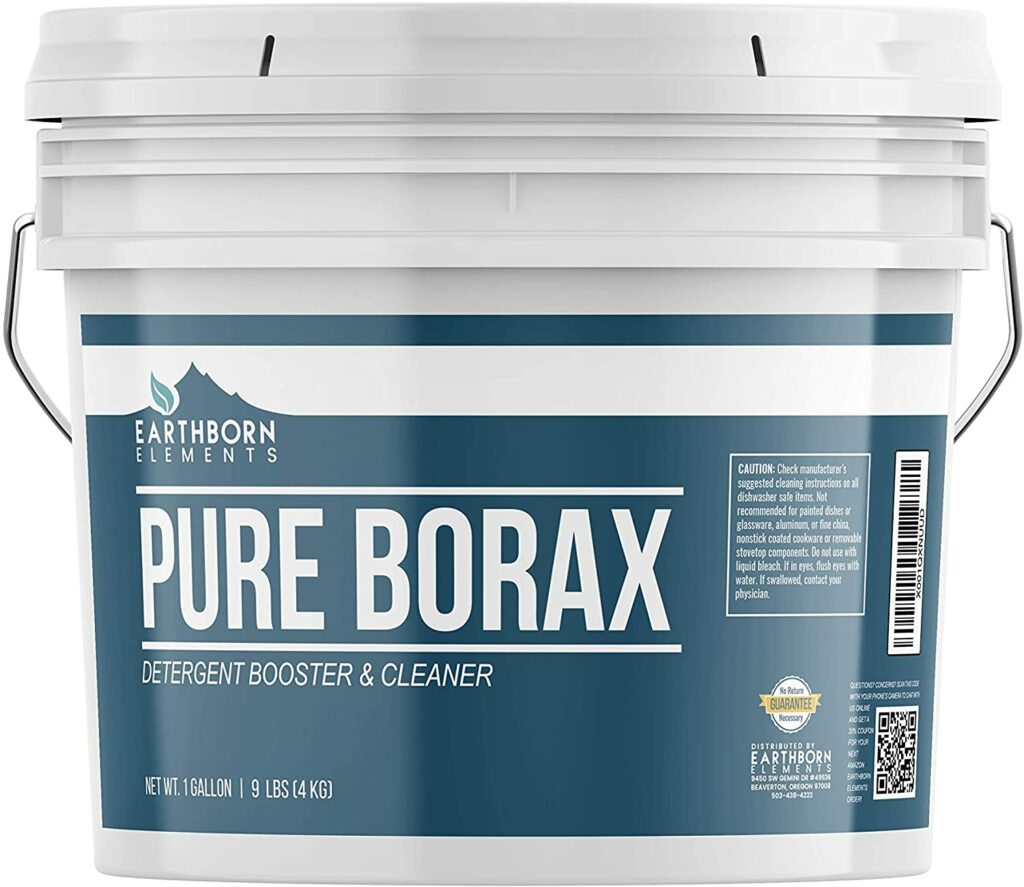
Another hack that most organic gardeners use is using household cleaning agents like borax for weed control.
A borax solution as herbicide is non-selective which means it will kill any plant in a treated area. You can use it for controlling Creeping Charlie and ground ivy (Glechoma Hederacea) are also more sensitive to borax.
To use borax as an herbicide you have to dilute it with water first. For 500 feet of lawn, use 5 ounces of Borax in 2 ounces of warm water and dilute it to 1.25 gallons of water. Apply the solution when no rain is expected for the next 48 hours. Repeat the application if the weeds are still popping up.
Borax has multipurpose use and contains no additives, preservatives, heavy scents, and irritants on the skin. It works wonders on drying up small weeds and never letting them come back. It is also safe for kids, pets, and the environment since sodium borate in borax is a naturally occurring substance.
Apply your homemade borax weed killer when weeds are actively growing. To prevent the chance of damaging your desirable plants, apply the solution when it’s not windy.
Pros
- Organic herbicide
- Multi-purpose: Cleaning & laundry agent and herbicide
- Affordable
- Kid & pet-friendly
- No harsh smell
- Best for organic gardeners who dislike the smell of strong vinegar
Cons
- Not all weeds can be sensitive enough to borax
- Does not prevent weed seeds from germinating
9. Avenger Weed Killer Concentrate
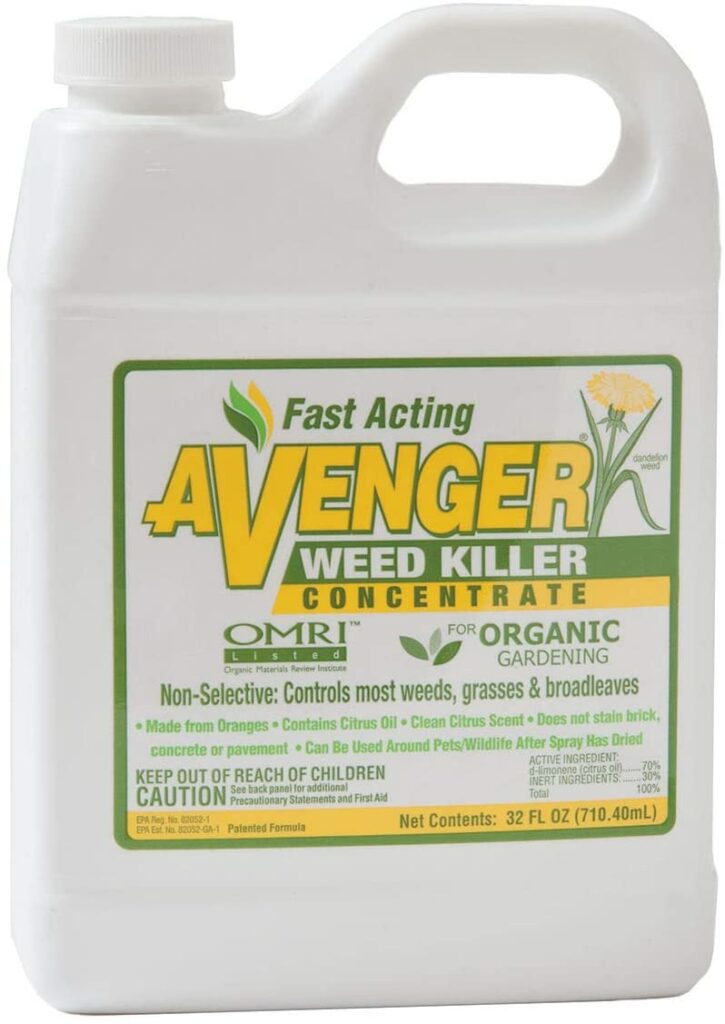
Another OMRI-listed organic weed killer on our list is the Avenger Weed Killer Concentrate. It is made of citrus oil from oranges which not only get rid of your weed problem but also makes your lawn smell citrusy.
It contains 70% citrus oil that contains D-limonene which strips away the waxy plant cuticle of weeds, causing them to dehydrate and die.
This herbicide can kill weeds within hours after application and can be applied in cold conditions at temperatures as low as 40F.
Here are the following weeds that it can manage:
- Spurge
- Sowthistle
- Redroot Pigweed
- Tumbling Pigweed
- Annual Bluegrass
- Shepherd’s Purse
- Common Purslane
- Common Chickweed
- Clover
- Hairy Fleabane
- Crabgrass
- Smooth Crabgrass
- Dandelion
- Whitestem Filaree
- Bermuda Grass
- Bindweed
- Shepherd’s Purse
- Prickly Lettuce
- Lambsquarters
- Little Mallow
The good feature of this herbicide aside from its scent and being organic is it comes with a white emulsion to help you mark the treated area. However, the white emulsion does not stain bricks and pavements. It is also safe to use around kids and pets as soon as the lawn dries up.
Due to the potency of citrus oil, do not apply it to any irrigation system. For best results, you should cover weeds thoroughly and make sure that they are dripping wet. Since it’s organic it can dissipate in the soil a few hours after application.
The recommended dilution for annual weed, you should use 1 part Avenger Weed Killer to 6 parts water while tough weeds require 1 part of Avenger Weed Killer to 41/2 parts of water. Check the diagram below for reference:
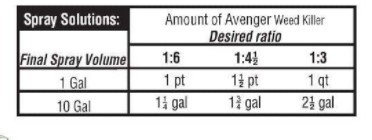
Dilution ratio for Avenger’s Weed Killer
It is one of the few organic weed killers that gained several certifications and approvals from organic gardening boards such as EPA, Organic Materials Review Institute (OMRI), U.S. Department of Agriculture’s (USDA), National Organic Program (NOP), Washington Organic Food Program (WSDA), and Generally Recognized As Safe (GRAS) by the FDA.
The only concern of gardeners for this weed killer is it’s a bit pricey and not effective to some tough and persistent weeds. However, after a continuous application tough weeds can still be controlled.
Weeds in a humid environment have thinner cuticles and have a higher chance to wilt and dry from herbicides.
Pros
- OMRI-listed
- Made from 70% citrus oil
- Comes with a white emulsion for application reference
- Safe for kids and pets
- Environment-friendly
- Smells fresh due to its citrus scent
Cons
- A bit pricey
- Requires re-application for tough weeds.
Other Weed Control Options
Aside from using a weed control solution, there are also other ways to prevent the weeds from popping up in your garden.
If most organic weed killers keep failing, you may try the following methods:
Landscape Fabric
Covering a small patch of your lawn with a landscape fabric can help prevent the weed seeds from germinating. They need the sunlight to germinate well and blocking the sun rays can keep them stay as dormant seeds.
One of the best landscape fabrics that you can try is from ECOgardener Premium 5oz Pro Garden Weed Barrier Landscape Fabric.
Mulch
Another ground cover option that is more pleasing to the eye is placing a mulch in your garden. Mulch deprives the soil of sunlight and helps retain the soil moisture.
Here are some quality and affordable mulch in the market: EZ-Straw Seeding Mulch with Tack and Pine Bark Mulch.
Ground Covers
If you want more greenery in your lawn and retain the nutrients for future planting, you can use plants as ground cover.
Outsidepride Crimson Clover is a good option along with other creeping plants.
DIY Homemade Weed Killers
If you want to try to take advantage and be more resourceful, you can first try making a homemade herbicide. Using your kitchen ingredients, you can make your concoction of organic weed killer. Here’s how:
Ingredients:
- 1-gallon white vinegar
- 1 cup salt
- 1 tablespoon liquid dish soap
Directions:
- Combine ingredients in a spray bottle.
- Mix well to dissolve salt properly. Salt helps dehydrate plants as soon as the acetic acid in vinegar strips off the waxy cover of plants.
- Apply on weeds at the sunniest time of day to achieve the best results.
Tips For a Successful And Safe Weed Removal
Here are some of the important reminders before you buy and treat your lawn for weed control:
(1) Water-stressed, mature, and shaded weeds are more tolerant of herbicides. The sun helps thin out the waxy cuticle or covering of leaves that aids the acetic acid in stripping it off and dehydrating the plant. It’s best to pull the woody and matured weeds and pre-emergent herbicides to prevent the weed seeds from germinating.
(2) Horticultural acetic acid is a more potent version of our kitchen vinegar. Due to its high acid content, it is toxic to birds and marine life. Warnings about the risks of horticultural vinegar use are not about their chemical content. They are naturally toxic to other animals due to intolerance of extreme acidity.
(3) Always wear protective gear in applying any garden pesticide and herbicide. Organic or not, you are handling acids that may cause skin and eye problems. When it comes to health, it’s better to be safe than sorry.
(4) Always check if an organic weed killer is a selective or non-selective herbicide and if it’s pre-emergent or post-emergent. Checking about those features will help you set your expectation for the product and judge it based on its real performance.
(5) Keep your kids and pets away from the treated area even if the manufacturer claims that the herbicide is safe for them. Allow the treated area to dry for about 2 to 3 hours. You won’t lose anything for being extra cautious in handling acids from herbicides, right?
(6) Lastly, weed control takes a lot of patience and persistence. Some weeds are just too tough due to their deep roots. Keep applying an organic weed killer in them until the weed fails to develop enough roots to stay alive.
(7) Do not rely on the product description in online shops for the features of the product. You will always get complete information about the product from its official website.
Final Thoughts
We hope that the organic weed killers that we featured in this post helped you find the one for you.
The best ones that we recommend from our list are Avengers Weed Killer as an organic and scented weed killer, Borax for its multipurpose use, and Green Gobbler for outstanding performance that is at par with its chemical counterpart- RoundUp.
If you find this post helpful, please don’t forget to share it with your friends. Also, let us know in the comments which organic weed killer worked best for those stubborn weeds in your garden.
